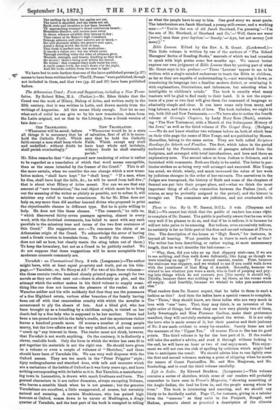The Athanasian Creed; Facts and Suggestions, including a New Rans-
ration. By Robert Eden,..M.A. (Parker.)—Mr. Eden thinks that the Creed was the work of Hilary, Bishop of Arles, and written early in the fifth century, that it was written in Latin, and drawn mainly from the writings of Augustine. All this seems likely enough. Now let us see what sort of relief he can give na by his new translation, taken from the Latin original, not as that in the Liturgy, from a Greek version of late date :— Ow TRANSLATION. NEW TRANSLATION.
"Whosoever will be saved: before "Whosoever would be in a state all things it is necessary that he of salvation, first of all it is neces- hold the Catholic Faith. Which sary that he hold the Catholic faith except a man shall keep whole Faith. Which except any shall and undefiled : without doubt he have kept whole and inviolate, shall perish everlastingly." without doubt he shall eternally perish."
Mr. Eden remarks that "the proposed new rendering of salcus is rather to be regarded as a translation of which that word seems susceptible, than as the sense intended by the framer of the Creed." This is all the more certain, when we consider the one change which a new trans- lation makes, "shall have kept" for "shall keep." "If a man, when he dies, shall have kept the faith, &c., he will be saved from hell-fire ;" that is about what Hilary of Arles meant. Nor can we see that any amount of "new translations," the real object of which must be to bring out the meaning of the writer as plainly as possible, not to soften it, will minister any relief to tender consciences. So far Mr. Eden does not help us, any more than did another learned divine who proposed to print the objectionable clauses in different type. But he is quite willing to help. He does not like these clauses. "The research," he tells us, "which discovered thirty -seven passages agreeing, almost in every word, with the doctrinal statements, has failed to meet with any such parallels to the minatory tone and terms of the two first sentences of this Creed." His suggestions are :—To renounce the claim of an Athanasian origin of the Creed. To acknowledge the_error of having used a Greek version to translate from. To modify the clauses. (He does not tell us bow, but clearly wants the sting taken out of them.) To keep the formulary, but not as a Creed to be publicly recite& We do not suppose that these suggestions will be more acceptable than moderate counsels commonly are.


































 Previous page
Previous page